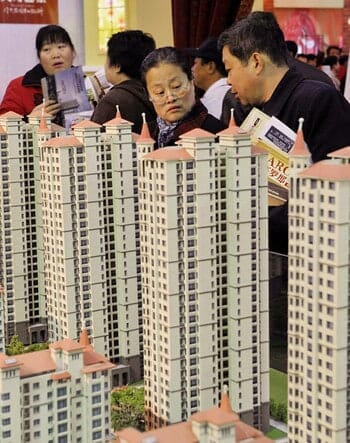The trend toward easing government policies controlling the real estate market gained a major follower within the last few weeks as Shenyang has reportedly waived restrictions on ownership of multiple homes.
The move was reported today in the Wall Street Journal and appears to be the strongest measure yet to overcome a severe slump in home sales that has begun to worry local governments that are dependent on the real estate market for much of their revenue.
Although there has been no official statement made by Shenyang authorities, the Journal article cited real estate agencies in Shenyang which relayed government messages that rules restricting households to only one additional home purchase beyond their existing holdings would no longer be enforced for certain areas in the city of more than six million people.
“There is no written confirmation, but about two weeks ago some developers were informed in a meeting with local authorities that home purchase curbs would not be stringently implemented at the property transaction center,” the Journal’s Esther Fung quoted a local representative of consultancy China Real Estate Information Corp as saying.
The actions by Shenyang appear to support the widely discussed concept that the government will begin regulating real estate markets in smaller cities less stringently, while attempting to hold in check overheated markets in the country’s first-tier urban areas.
Bigger City, Bigger Real Estate Rule Changes
Shenyang is not the first Chinese city to relax housing sales restrictions as a potential remedy to the current real estate slump but its measures appear to be more significant than those taken in other cities, and its size, stature as the capital of Liaoning province also means that, if verified and allowed to stand, other cities are likely to soon follow suit.
So far this year, the cities of Wuhu and Tongling in Anhui province, as well as Nanning in Guangxi and Wuxi in Jiangsu have all introduced changes to existing regulations that would qualify more buyers as local residents, and potentially boost property sales. However, all of these cities, with the exception of Wuxi, which is also about six million people, are much smaller than Liaoning, and Wuxi ranks as only the third-largest city in Jiangsu, where it is overshadowed by Suzhou and Nanjing.
Shenyang’s apparent decision to waive restrictions on the quantity of homes owned a by a single household is also a much stronger measure than attempting to expand the residency pool, especially considering that the limits on household home ownership were by far the most effective among a string of measures introduced to cool down the market during 2010 and 2011.
Among China’s Most Oversupplied Cities
The interest of the Shenyang government in rekindling home sales is easy to understand, after the city government reportedly failed to sell off four out of five plots of land put up for auction early last month, and only netted a bit more than the floor price for the one piece of land that was purchased.
However, allowing consumers to buy more homes may not be the fix the market needs if no one wants to buy those homes. In recent months a number of market experts, including a vice-president of China Vanke and the head of research for property consultancy Centaline have held out Shenyang as an example of China’s most overbuilt cities for residential real estate.
So while the local authorities in Liaoning province’s largest city may be hopeful of turning around their once booming housing market, the recent changes in policy may not be enough to reinflate the local housing bubble.

Leave a Reply